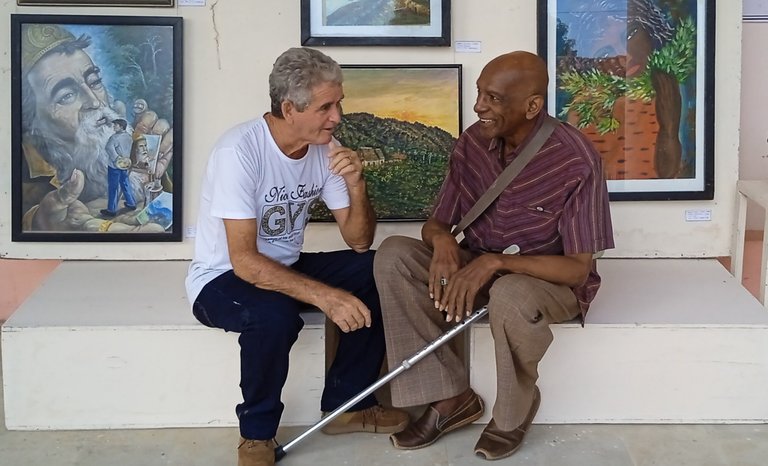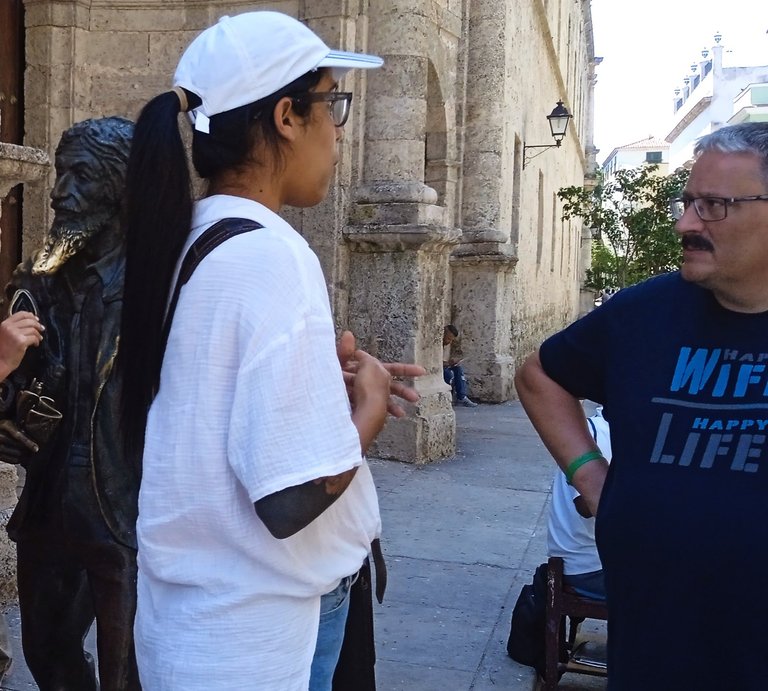
VERSION EN ESPAÑOL.
%%%%%%%%%%%%%%%%%%%%%%%%%%
Hola a todos por acá en esta acogedora comunidad, que más parece una sinagoga de la modernidad, que una red social articulada para compartir conocimientos y experiencias.
Así de profunda siento a esta parte del gran panal.
Y es que, por ejemplo, este tema al que nos convoca el "decano de Holos&Lotus, @emiliorios" así como otros así lo confirma.
De principio me llega a la mente aquella frase bíblica de "que tire la primera piedra el que esté libre de pecados" porque realmente en estos tópicos de los entuertos de la mente, nadie _ hasta que no descubra por sí mismo como hacerlo puede decir que no ha participado conscientemente, o ha sido víctima de estás perjudiciales actitudes y conductas humanas.
El comentario, en sentido general, es un ejercicio constante y patrimonio de la humanidad. Determinar si existe en el lenguaje de otras especies es tarea de la ciencia, y hasta que no se demuestre lo contrario, tenemos esa prioridad social.
Para que exista el comentario es condición sinequon que exista un emisor y por lo menos un receptor, de lo contrario sería un monólogo absurdo y estéril.
El comentario tiene carácter histórico y ha evolucionado a la par que el hombre, quien se ha valido a través del discursar del tiempo, de los recursos y medios de cada época para transmitirlo. Así, del primer modo, boca _ oreja, ha llegado a su fase superior con las nuevas tecnologías. Y desde ese punto de vista no hay todavía, hasta aquí, un cuestionamiento parcial sobre el "comentario".

El comentario tiene un pariente muy cercano en el “rumor”. Pero este es mucho más dañino y de mayor alcance sobre todo cuando es mal intencionado.
Hay que aclarar que en los tiempos modernos. "El comentarista" es una figura social reconocida legalmente y va desde el más inexperto aficionado, hasta el más profesional y calificado. Y los hay en diferentes áreas de la vida social. Deporte, economía, política, cultura, etc.
Estos comentaristas oficiales tienen su apoyo en todos los medios de comunicación existentes, incluyendo el actualmente más poderoso de todos: el internet.
Pero la cuestión no radica en si son anónimos, reconocidos, aficionados o profesionales, sino en la intensión que se introduce en el “comentario”.
El comentarista, mal intencionado, casi siempre viste de buenas intenciones, de imparcialidad, y hasta de ingenuidad el ácido o el veneno que introduce en su discurso, y tiene como recursos eficaces el doble sentido, el sarcasmo y la ironía. Y si el rumiante deja el espacio para la duda de la veracidad, lo que permite desmantelar los efectos a tiempo, el comentarista da por cierto y consumado lo que dice de la víctima.
El comentario ejercido desde los centros de poder desvían el curso de situaciones y acontecimientos con resultados aveces catastróficos para la vida de las personas y los grupos sociales.
Cuando en un comentario de cualquier tipo se exaltan con un propósito oculto las cualidades negativas del aludido y no aparece una contrapartida esclarecedora a tiempo las consecuencias son nefastas.
Desplazar, restar brillo, sembrar cizaña, minar de dudas y preocupaciones las mentes dependientes y poco entrenadas, es campo fértil para los creadores de comentarios enfermizos. Y hay quienes tienen doctorados en esa materia, y otros ingenuamente nos inscribimos en los cursos gratuitos de de esa universidad popular.
Un comentario adverso ,incluso, hecho sin malas intenciones solo por demostrar conocimientos y méritos desde puntos de vista personales, puede destruir o atrazar la llegada al éxito de cualquier ser humano.Y relato aquí una pequeña. experiencia .

Un día, en una de mis exposiciones personales más importante en la capital, y valorando la posibilidad para un salto de reconocimiento en la farándula del arte, le preguntaron a un relevante pintor, que creía de mi obra, y con solo este decir: es muy bueno, pero creo que aún no está maduro, hecho por tierra que en ese momento fuera incluido en un importante proyecto curatorial. Aquel comentario personal fue tomado en ese momento como patrón de calidad y sus efectos fueron visibles en aquel momento de mi carrera artística.
Yo tú no me metía ahí, porque fulana… Te lo digo y después no digas que no te advertí, en esa casa no hay quien viva porque… ¡Tú vas a saber lo que es amarrar mula cerrera en ventana vieja! Y así muchas formas clásicas de orientar el comentario con su carga negativa en, o sobre los demás.
Hay comentarios muy sutiles que entre líneas dejan ver las verdaderas intensiones del adónde se quiere llegar, sin comprometerse en el asunto que se pone en juego,

Pero como dije al comienzo, aquí nadie está exento de haber metido el delicado en un comentario, ya sea a propósito, o sin propósito, porque además no depende solo del emisor sino también del receptor que casi siempre es intermediario y agente transmisor, porque al final el de la casa es el último que se entera, y casi siempre tarde y cuando no hay remedio.
Este tema es muy amplio y entretegido en las relaciones sociales e interpersonales, y ponerle coto es acto difícil, pues no puede ser regulado por leyes ,estatutos, normas etc, y es parte de la convivencia del día día.
Los peores comentarios son los que salen de personas que y como radadales o como camaras ocultas humanizadas.Son sistemas perfectos en la detección de los puntos neurálgicos o las fallas de los demás.
Pero es bueno también que como parte del crecimiento se aprenda a detectar su presencia y trabajarlo a nivel conciente para amortiguar sus efectos nocivos.
Cómo condicion humana, en mayor o menor grado todos formamos parte de una red de opiniones y comentarios del la que no podemos escapar ni tampoco ignorar, pero si aprender a vivir dentro de ell
Cómo siempre saludo a los s habituales @emiliorios, @jrobe ya @charjain.
Gracias por acompañarme.
Texto traducido con Deelpp traductor.
Fotos tomadas con mi Xiaomi Redmi9a.
VERSION IN ENGLISH
%%%%%%%%%%%%%%%%%%%%%%%%%%%

Hello everyone here in this welcoming community, which seems more like a synagogue of modernity than a social network articulated to share knowledge and experiences.
That's how deep I feel this part of the great honeycomb.
And it is that, for example, this topic to which the "dean of Holos&Lotus, @emiliorios" as well as others summons us confirms it.
From the beginning it comes to my mind that biblical phrase of "let him who is without sin cast the first stone" because really in these topics of the mind's entanglements, no one _until he discovers for himself how to do it can say that he has not participated consciously, or has been a victim of these harmful human attitudes and behaviors.
Commentary, in a general sense, is a constant exercise and heritage of mankind. To determine whether it exists in the language of other species is the task of science, and until proven otherwise, we have that social priority.
For commentary to exist, it is a sine qua non condition that there be a sender and at least one receiver, otherwise it would be an absurd and sterile monologue.
The commentary has a historical character and has evolved along with man, who has used, through the discourse of time, the resources and means of each era to transmit it. Thus, the first way, mouth _ ear, has reached its superior phase with the new technologies. And from this point of view there is not yet, up to this point, a partial questioning of the "commentary".
Commentary has a very close relative in "rumor". But the latter is much more harmful and far-reaching, especially when it is ill-intentioned.

It should be clarified that in modern times. The "commentator" is a legally recognized social figure and ranges from the most inexperienced amateur to the most professional and qualified. And there are them in different areas of social life. Sports, economy, politics, culture, etc.
These official commentators have their support in all existing media, including the currently most powerful of all: the Internet.
But the question is not whether they are anonymous, recognized, amateurs or professionals, but in the intention that is introduced in the "commentary".
The commentator, ill-intentioned, almost always dresses with good intentions, impartiality, and even naivety the acid or poison he introduces in his discourse, and has as effective resources the double meaning, sarcasm and irony. And if the rumor-monger leaves room for doubt about the veracity, which allows dismantling the effects in time, the commentator takes for certain and consummated what he says about the victim.
The commentary exercised from the centers of power divert the course of situations and events with sometimes catastrophic results for the life of individuals and social groups.
When in a commentary of any kind the negative qualities of the person being alluded to are exalted with a hidden purpose and no clarifying counterpart appears in time, the consequences are disastrous.
Displacing, detracting brightness, sowing tares, undermining doubts and worries in dependent and poorly trained minds, is a fertile field for the creators of sick comments.
And there are those who have doctorates in that matter, and others naively enroll in the free courses of that popular university.
An adverse comment, even made without bad intentions just to demonstrate knowledge and merits from personal points of view, can destroy or hinder the arrival to success of any human being, and I relate here a small experience.
One day, in one of my most important personal exhibitions in the capital, and valuing the possibility of a leap of recognition in the art show business, a relevant painter was asked what he thought of my work, and with just this one comment: it is very good, but I think it is not mature yet, I was included in an important curatorial project at that moment. That personal comment was taken at that time as a standard of quality and its effects were visible at that moment in my artistic career.
I wouldn't go in there, because so-and-so... I'm telling you and then don't say that I didn't warn you, there's no one living in that house because... You're going to know what it's like to tie a mule to an old window! And so many classic ways of directing the commentary with its negative charge on or about others.

There are very subtle comments that between the lines let you see the true intentions of where you want to go, without compromising on the issue at stake,
But as I said at the beginning, no one is exempt from having put the delicate in a comment, either on purpose, or without purpose, because it depends not only on the sender but also on the receiver who is almost always an intermediary and transmitting agent, because in the end the one at home is the last one to find out, and almost always late and when there is no remedy.
But as I said at the beginning, no one is exempt from having inserted the delicate in a comment, either on purpose, or without purpose, because it depends not only on the sender but also on the receiver, who is almost always an intermediary and transmitting agent, because in the end the one at home is the last to know, and almost always late and when there is no remedy.
This issue is very broad and intertwined in social and interpersonal relationships, and put a stop to it is difficult act, because it can not be regulated by laws, statutes, rules, etc., and is part of the daily coexistence.
The worst comments are those that come from people who are like radadales or humanized hidden cameras, perfect systems in the detection of the neuralgic points or the faults of others.
But it is also good that as part of the growth we learn to detect their presence and work on a conscious level to cushion their harmful effects.
As a human condition, to a greater or lesser degree we are all part of a network of opinions and comments from which we can neither escape nor ignore, but we can learn to live within it.
As always I greet the regulars @emiliorios, @jrobe and @charjain.
Thanks for joining me.

Text translated with Deelpp translator.
Fotos tomadas con mi Xiaomi Redmi9a
PHOTOS taken with my Xiaomi Redmi9a

🇨🇺✌️🇨🇺✌️🇨🇺✌️🇨🇺✌️🇨🇺✌️🇨🇺✌️🇨🇺✌️🇨🇺
Muchas gracias @davidsantafe por esta publicación; y creo que nos paseaste por una buena cantidad de significados.
Me encantó.
Muy buena perspectiva de lo que es el tema de comentar y emitir opiniones.
Como bien dices allí, es un tema super amplio.
Recibe mis saludos amigo mío.
Gracias profe @emiliorios, siempre estoy atento a sus iniciativas y sus saberes.
Hey amigo! Muy sabio eso de que hasta que uno no experimenta algo es difícil que pueda tener una idea clara sobre eso. Idea individualizada por supuesto. Un saludo amigo. Muy buen post!
Gracias por tu saludo, es apreciado.
Pensé, al leerte, en los críticos en general, esos que nunca les hemos visto un trabajo, pero están ahí para dar su nada humilde opinión y hacen desastres con sus palabras.
Los peores son esos que por la política han asumido algún rol y los colocan en el área cultural, es terrible sobre todo para quien está iniciándose.
Un pintor me comentó una vez que se había sentido muy mal e incluso dejado de pintar cuando alguien le dijo que su obra era «ingenua»; tiempo después supo que era un tipo de arte también llamada naif.
También los hay especialistas en hacer malos comentarios, creo que voy a hacer el post.
Buen tema.
Saludos y abrazos.
@tipu curate 5
Upvoted 👌 (Mana: 0/75) Liquid rewards.
Muchas gracias por la información y el apoyo a mi publicación.@mireyaromeros y @tipu.